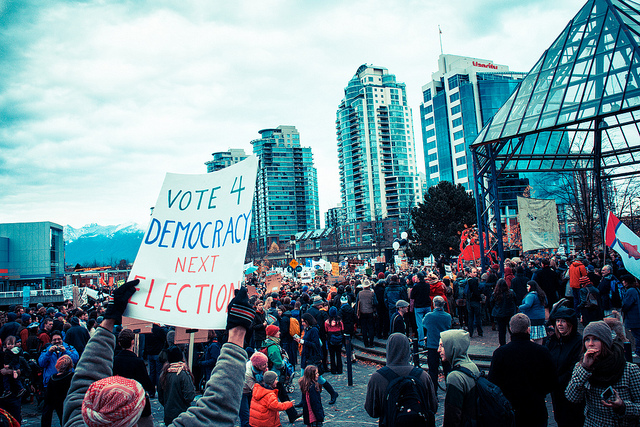It’s the last week of our supporter drive and boy, do we need you! Please help rabble.ca amplify democratic movements. Become a monthly supporter.
Let’s face up to it. Making voting mandatory under the electoral system we have now would be like demanding that a student learn music on a keyboard that produces the intended note less than half the time — and requires them to wait four years between keystrokes.
With drooping voter turnout nationally and the recent “none of the above” election in Ontario, we’ve been hearing a lot of talk lately about mandatory voting in Canada. Just as we’re expected to pay taxes, the argument goes, so too should we be required to mark an ‘x’ on Election Day.
But maybe the problem isn’t low voter turnout. Maybe low turnout is the symptom — and the current first-past-the-post system is the sickness. In our multi-party, single-member plurality system, elected representatives frequently win their seats on the basis of fewer than half the ballots cast in their riding. Once governments are formed on top of this shaky democratic ground, they tend to govern as though they had strong mandates from the entire public. Meanwhile, the growth of executive power in Canada — the strongest in the western world, according to some experts — means that even elected representatives end up feeling powerless in their relations with party leadership.
“When we take these distortions of the individual citizen’s vote to heart, it starts to look as though what citizens get from their governments frequently bears little resemblance to what they voted for. As Alison Loat, director of Samara — a nonprofit, non-partisan advocacy group for citizen engagement — told a House of Commons committee a few months back, one of the main factors behind low election turnout is that citizens who don’t think their votes matter tend not to vote. Motivation, she said, “includes believing that that one’s vote … makes a difference.”
Commentators decry the low voter turnout trend as a chronic disease and claim that high voter turnout is an end in itself. But to institute mandatory voting risks covering up the real problem — the powerlessness and alienation that people feel when confronted with an election — in favour of what amounts to legally mandated ballot-stuffing.
Our electoral system can be demoralizing for many voters; mandating voting might make it even more so. Not only would we be telling voters that they scarcely have a role in determining who wields power (and to what end) but we’d be coercing voters into taking part in a ritual celebrating and validating their lack of control over how the country is governed.
Elections are tools designed to distribute power democratically and renew our sense of belonging to a national community. But tools that don’t work any more need to be fixed, or replaced. When it comes to the Canadian electoral system, we seem unwilling to engage in the same experimentation and augmentation that pushes other technologies forward. Instead, more often than not, we blame the user — the eligible voter — for refusing to use defunct technology.
Our system is based on a simple idea: that people are wise enough to choose how they are governed, and who does the governing. Why assume voters are smart enough to pick governments but not smart enough to reject a system that is clearly not working as it should? Rather than slapping non-voters with fines, would it not be more productive to have citizen disengagement act as the spark that ignites serious reform of our democratic infrastructure?
That reform certainly could involve the adoption of proportional representation or a ranked ballot, to make the Commons reflect the wishes of Canadians in its seat distribution. It also could involve a more holistic study or national conversation about how voters interact with government, politicians and each other. It might involve the exploration of more radical, immersive and participatory forms of democratic empowerment, during and between elections.
When cellphones arrived, we didn’t force people to keep on using phone booths. Our electoral system is obsolete. Canadians should not be scolded for casting aside their ballot and waiting for a better technology — a better mode of interaction with their government and their country — to come along.
Stephen Middleton and Mark Dance worked for MPs on both sides of the House of Commons with the non-partisan Parliamentary Internship Programme. Middleton studies medicine at Dalhousie University in Halifax and Dance is a Studio Y innovation fellow at the MaRS Discovery District in Toronto.
This article is reprinted with permission from iPolitics ![]()
Photo: flickr/Chris Yakimov




